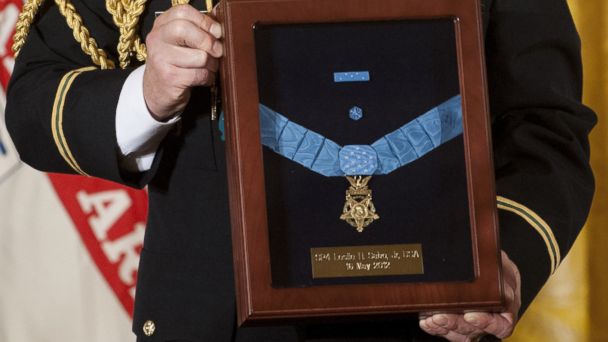Belated Medal of Honor for 24 Soldiers Overlooked Due to Race

Saul Loeb/AFP/Getty Images
Twenty-four Army soldiers who fought in World War II, Korea and Vietnam will receive the Medal of Honor next month, correcting oversights that prevented many of them from receiving the nation's highest award for valor because of their Hispanic, Jewish and African-American backgrounds, White House officials said today.
The awarding of 24 Medals of Honor - most of them posthumously - will be the largest number to be awarded at one time since World War II.
The process began in 2002 when Congress mandated that the military services review the cases of hundreds of Hispanic and Jewish service members who fought during World War II, the Korean War and the Vietnam War and received the Distinguished Service Cross instead of the Medal of Honor for their heroism. The Distinguished Service Cross is the nation's second-highest award for valor.
The 12-year review of cases ultimately identified 18 Army soldiers whose cases merited being upgraded to the Medal of Honor, officials said.
During the course of the review it was determined that six soldiers not of Hispanic or Jewish backgrounds should also have their Distinguished Service Crosses upgraded to the Medal of Honor.
The Medals of Honor will be awarded on March 18 in a White House ceremony that will be attended by the three living recipients - all Vietnam veterans - as well as the families of the 21 others who are receiving the award posthumously. Of the 24 recipients, seven served in World War II, eight in the Korean War and nine in the Vietnam War.
The majority of the new Medal of Honor recipients are of Hispanic descent, but the extensive review of cases began with an effort review the case of PFC Leonard Kravitz, a Jewish-American soldier who died in the Korean War.
Kravitz died on March 7, 1951, near Yangpyong when he remained at his machine gun position and provided suppression fire for his retreating unit after it had been overrun by enemy forces, officials said.
For five decades, his childhood friend Mitchel Libman campaigned on his Kravitz's behalf that he should have received the Medal of Honor.
Libman said today he was elated that his friend was finally receiving the award he felt he deserved all along. "I feel wonderful," Libman told ABC News. "I am so happy that this was finally done."
The Medal of Honor oversights "never should have happened in the first place," Libman said.
Libman initially campaigned for Kravitz to receive the Medal of Honor but soon began collecting the service records of dozens of other Jewish service members who had received the Distinguished Service Cross.
He ultimately got the support of former Florida Rep. Bob Wexler, who in 2001 succeeded in getting Congress to insert language into a Defense Department spending bill that ordered the review of cases involving Hispanic-American and Jewish-American service members.
If Leonard Kravitz's name sounds familiar it is because noted singer and songwriter Lenny Kravitz is named after the uncle he never knew. Libman said he hopes that his friend's famous nephew will be the one to accept his uncle's award on the family's behalf in March.
The review of military records found 17 Hispanic soldiers should have received the Medal of Honor. They include one of the three living recipients, Santiago Erevia of San Antonio, Texas, who served in Vietnam with the 101st Airborne Division.
In July, 1969, he took out four enemy bunkers in Tam Ky that had pinned down his unit.
His son Jesse told the Washington Post, "We've wondered why he didn't receive it the first time, and thought it may have been because of his name."
Five of the recipients identified themselves in military records as "Caucasian," which made it difficult for investigators to determine their ethnic or religious affiliation, officials said.
The case of Staff Sgt. Melvin Morris, another living recipient, came to light as part of the review of Distinguished Service Cross awards even though the original legislation did not cover African-American service members.
Morris was found deserving of the Medal of Honor for a 1969 combat engagement in Vietnam, where he was serving as a Green Beret. He was wounded several times as he rushed into a hail of enemy fire to recover the remains of a fellow team leader.
Morris said he never dwelled on having received the Distinguished Service Cross instead of the Medal of Honor for his heroic action. He told ABC News he did not even know about the award because at the time he had already returned to Vietnam after volunteering for another tour.
"That never bothered me," Morris said. "I never talked about the Medal of Honor."
Morris said President Obama called him last May to tell him the news that he had been selected though he had to keep the news confidential until now when the process was finalized.
When the president gave him the news, "I went down on my knees. I was in total shock ," Morris said, noting that Obama told him, "take it easy, be cool."
He said the president added: "I apologize for the oversight. This should have happened 44 years ago. I was overwhelmed."